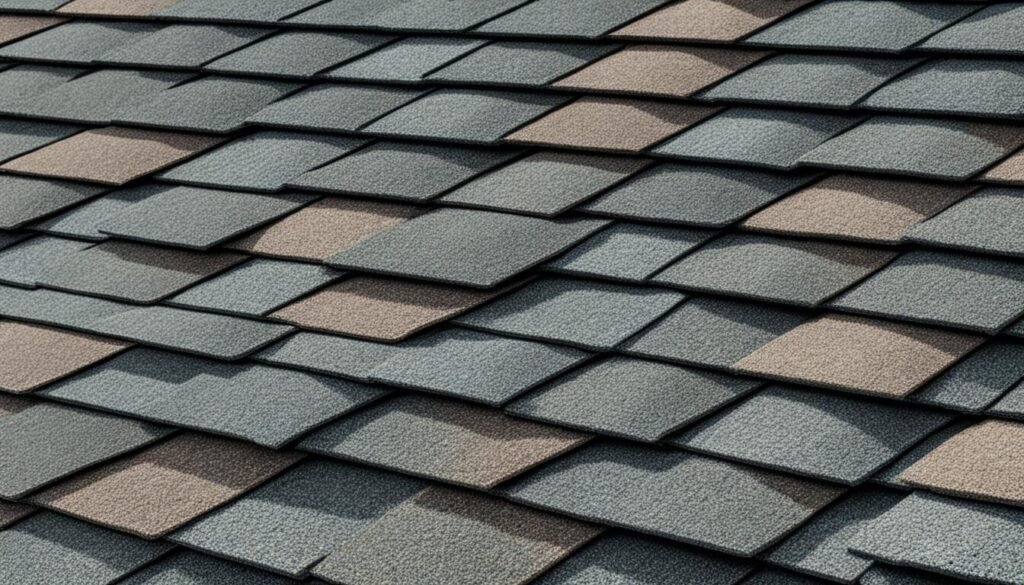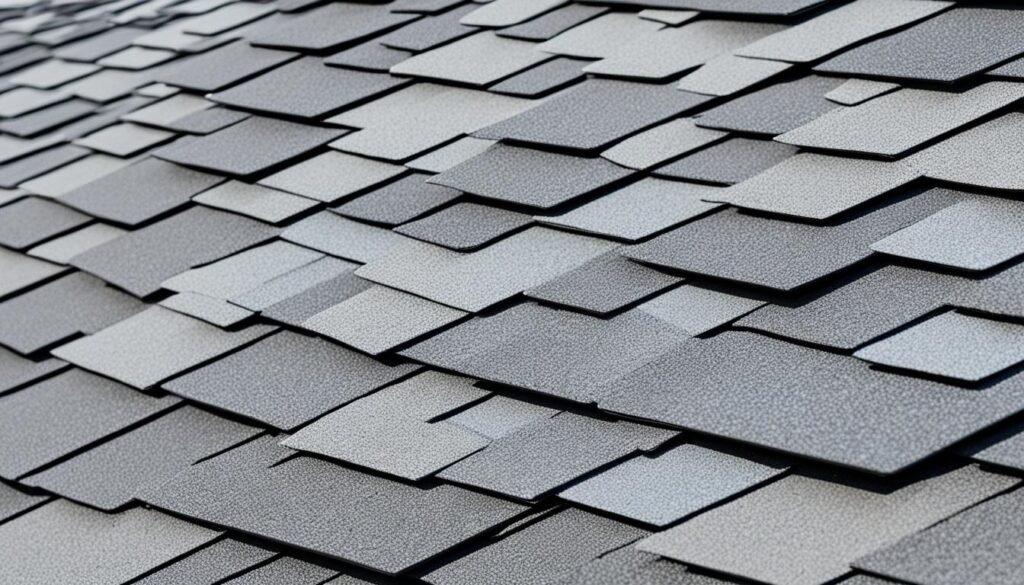The average cost of a new roof in the United States can vary from $10,000 to $30,000. It’s key to know the main elements that can change the total cost of your roof project. Local Roofer Pros team, with over 30 years of experience, has found 11 big factors that affect the final price.
Key Takeaways
- Roofing material choice, like asphalt shingles or slate, can notably sway the total cost.
- The size, design, and slope of your roof impacts the expenses for work and installation.
- Difficulties in access, roof openings, and the need for property shield can raise costs.
- Disposal charges, wages, and a roofing company’s costs also play a part in the total.
- Knowing these factors helps you plan better and budget well for your replacement roof.
Major Determinants of Roof Replacement Cost
The type of roofing material you pick is the main cost determinant for a new roof. You can go for affordable architectural asphalt shingles that start at $4.25 per square foot. Or, you might choose premium standing seam metal at $8.76 per square foot.
In between these options, you have cedar shake at $11-$14 per square foot and slate at $14.71 per square foot. Then there’s tile, which is close at $14.78 per square foot. Each type varies in durability, energy efficiency, and looks. These factors affect your long-term savings and home’s value.
Roofing Material Selection
Choosing your roofing material is a big cost decision. Asphalt shingles are affordable and last 25-50 years. They cost around $4.46 per square foot.
In comparison, metal roofing lasts 30-50 years but costs more at $8.76 per square foot. And clay tile has the longest lifespan at 50-75 years, with a price of $14.71 per square foot. Spending more upfront on better materials can boost your home’s value and save on energy over time.
Roof Complexity and Size
Your roof’s size and complexity affect its cost too. A simple roof is less expensive to install than a more intricate design. Looking at roofs with more parts like hips and valleys, they’re harder and more time-consuming to roof.
These complex structures need extra care and more labor, increasing costs. The roof’s size affects the materials and work hours, making larger roofs more expensive than smaller ones.
Roof extras like chimneys and skylights also increase costs. Lastly, the roof’s pitch, or how steep it is, impacts safety and the work needed, playing a part in the final bill.
| Roofing Material | Lifespan (years) | Cost per Square Foot |
|---|---|---|
| Asphalt Shingles | 30-35 | $4.46 |
| Metal Roofing | 30-50 | $8.76 |
| Clay Tile | 50-75 | $14.71 |

“The size and complexity of your roof significantly impact the replacement cost. A complex roof with multiple facets, angles, hips, valleys, and a steep pitch is more difficult and takes much longer to roof than a simple ranch-style roof.”
Additional Cost Considerations
Labor and Operating Expenses
Labor costs and the roofing company’s operational expenses are critical. They really affect the total cost of replacing a roof. The amount of money you pay for labor depends on many things. This includes the skills of the workers, how much experience they have, and how fast they work. The cost also includes the company’s general business expenses. This covers things like the cost of buildings, maintenance of vehicles, insurance, and the wages of employees.
The average labor costs run between $2 and $7 for every square foot. This makes up about 40% to 50% of the budget for replacing a roof. The actual cost may change depending on the area you live in. It’s also affected by how many people need roofing services and how hard the project is.
Disposal and Property Protection
Getting rid of the old roofing materials costs money. Contractors have to pay to dump it and transport it responsibly. This step can increase the project’s cost by a lot. It all depends on the roof’s size and how much waste there is.
The contractor also has to keep your property safe during the project. They might use tarps, boards, and other things to protect your home. This is to keep your lawn, windows, and other parts of the house safe. However, these measures also add to the project’s total costs.
| Cost Consideration | Average Cost Range |
|---|---|
| Labor Costs | $2 – $7 per square foot |
| Roofing Company Operating Expenses | Varies based on overhead costs |
| Disposal of Old Roofing Materials | $1 – $5 per square foot |
| Property Protection (tarps, wooden boards) | $500 – $1,500 per project |

It’s important for homeowners to know about these extra costs. This way, you can be ready for the full financial impact of replacing your roof. Knowing all the costs involved helps make your project go smoothly.
Conclusion
When you need to replace a roof, many things can affect the price. For instance, the type of roofing material you choose and how complex your roof’s design is can change the total. Labor costs and fees for getting rid of old material also play a big part. It’s important for U.S. homeowners to understand these costs. This way, they can set a correct budget and make smart choices for their roofing project’s costs.
Local Roofer Pros knows this well and offers help across the United States. If you’re looking into why roof costs go up or checking out your options for a new roof, they can guide you. Their team is set to answer any questions or offer a consultation. Just call them at 951-666-5881 or go to roofingcontractorsmurrieta.com.
Knowing the prices that come with changing your roof helps homeowners in many ways. By making wise decisions, they can get a roof that is both durable and budget-friendly. This ensures their new roof keeps their home safe for a long time.
FAQ
What are the biggest factors that impact the cost of a new roof?
How do different roofing materials affect the cost?
How does the size and complexity of a roof affect the replacement cost?
What other factors can increase the cost of a new roof?
Where can homeowners turn for expert guidance on roof replacement costs?
Source Links
- https://www.billraganroofing.com/blog/factors-impact-cost-new-roof
- https://rescue-my-roof.com/blog/factors-that-increase-roof-replacement-costs/
- https://aicroofing.com/blog/roof-replacement-costs/
- https://www.thisoldhouse.com/roofing/reviews/new-roof-cost
- https://hammersmithrva.com/understanding-the-cost-of-a-new-roof-what-factors-determine-the-price/
- https://time.com/personal-finance/article/how-much-does-roof-replacement-cost/
- https://www.forbes.com/home-improvement/roofing/roof-replacement-cost/
- https://www.architecturaldigest.com/reviews/roofing/cost-to-raise-roof
- https://www.gravesbros.com/blog/what-makes-a-roof-cost-more
- https://www.thisoldhouse.com/roofing/reviews/cost-to-raise-roof
- https://medium.com/@lookoutaustraliaa/understanding-the-factors-that-impact-roof-repair-costs-2e9a4646ff71
- https://amconstruct.com/determinants-of-how-much-will-my-roof-replacemen/
